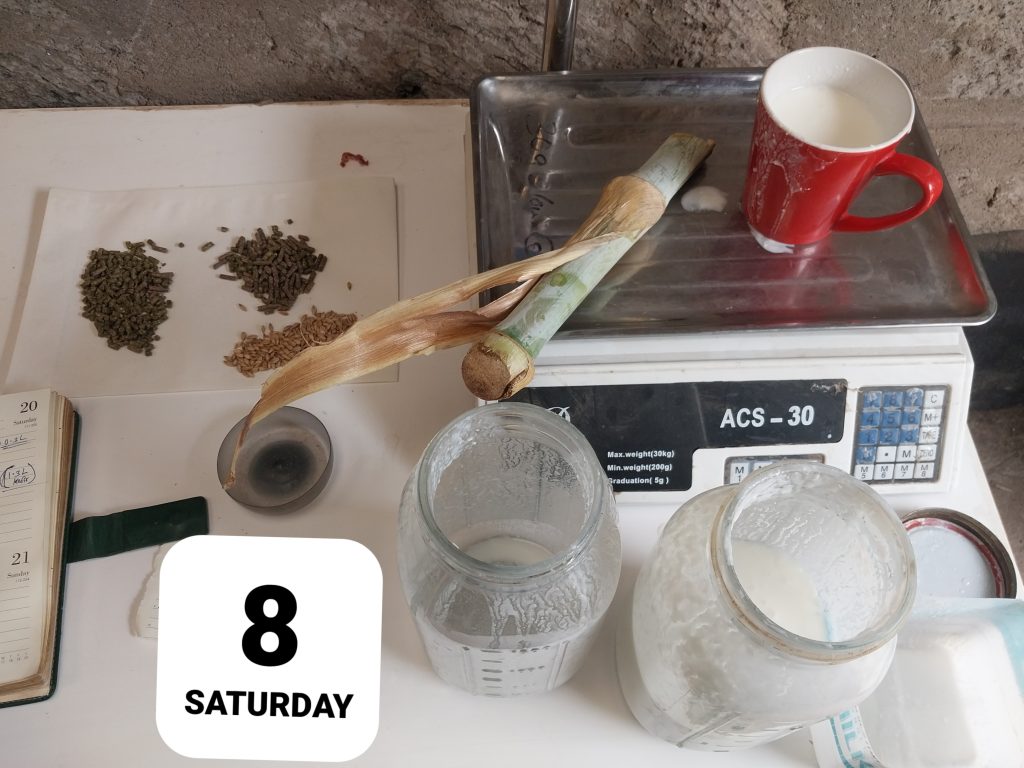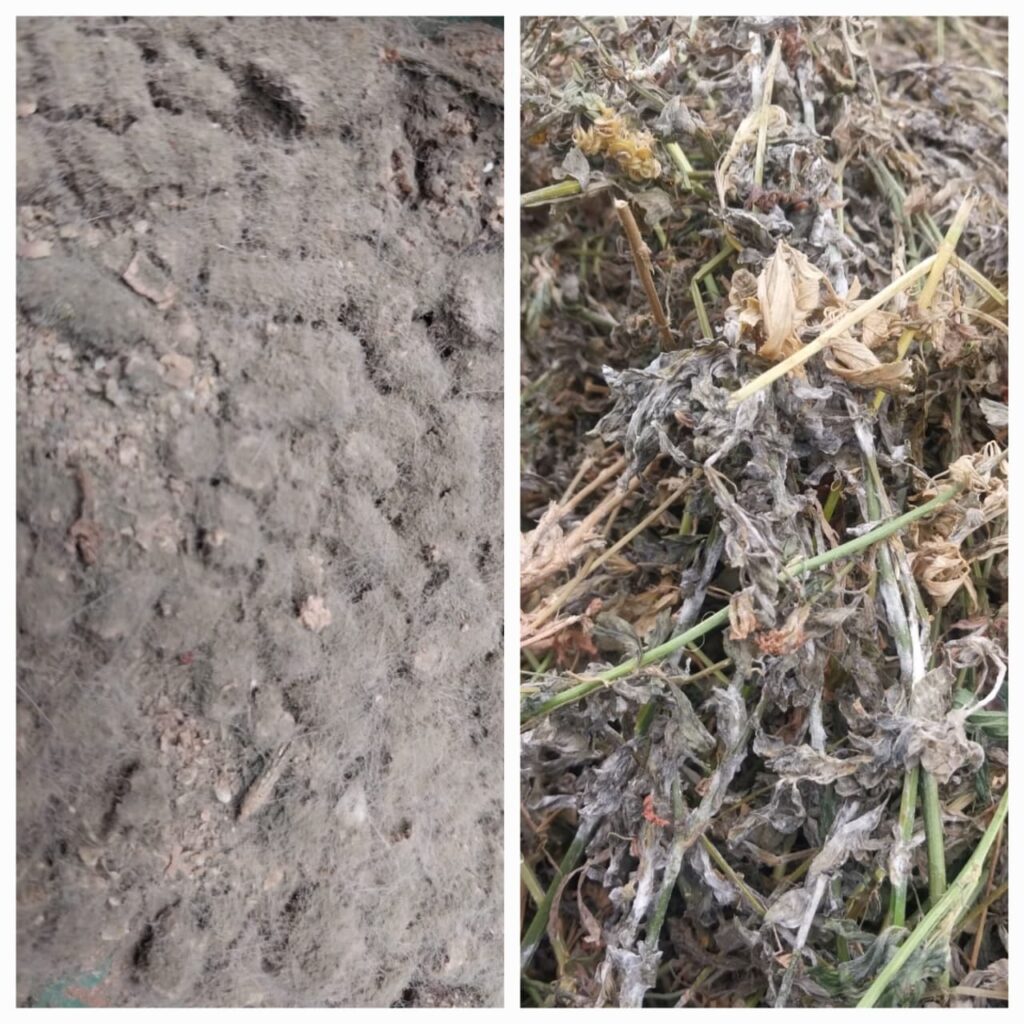Previously, we discussed here what causes sudden rabbit deaths, identifying that 7 out of the 16 causes were feeding-related: These included:
- Sudden Change of Diet
- Introducing Or Using Fresh Greens as the Primary Diet
- Risk of Gut Shock from Sudden Feed Changes
- Poisonous Feeds
- Deficient Feeds & Floppy Rabbit Syndrome
- Water Deprivation
- Gastrointestinal Stasis
Never forget that rabbits are herbivores, and their primary diet should consist of hay, making up 80% of their feed intake. However, the remaining 15-20% can be provided by pellets, either alone or supplemented with 5% wilted greens for farmers who have reliable access to them.
This pellet portion is packed with crucial nutrients that support the well-being of your rabbit. Pellets serve as a supplement to fill in the nutritional gaps that may exist in hay, which typically consists of grass fodder crops like Bhoma Rhodes or other grasses that can be cut and wilted.
Hay alone often lacks the variety of green matter needed for a complete diet. Some farmers make the mistake of overfeeding pellets or relying on them too heavily, hoping for quick weight gains. However, this is where feeding mistakes are most likely to occur. Additionally, some pellet manufacturers may produce batches that lack essential components for a balanced diet. Pellet vendor shops or the farmer may also store them for very many months, or in moist storage, contributing further to toxicity related to such storage or expiry.
While pellets are important, hay is crucial because it provides the fiber necessary to sustain healthy bowel movements in herbivorous rabbits.
This article dives deeper into feeding mistakes farmers make, how to identify signs of both proper and improper feeding, and actionable solutions to prevent these issues.
Indicators of Good Feeding and Health
Active Eating: Healthy rabbits should be seen eating regularly. We typically advise feeding pellets as one serving in the morning, followed by hay for the rest of the 24-hour period. A hungry rabbit, within 12 hours after the pellets are depleted, should be seen happily pulling hay from their racks. At Rabbit Crew Kenya, we feed pellets in the morning along with hay and provide automated water. The rabbits enjoy their pellets in the morning and will happily feast on hay starting around 4 pm, continuing until the next morning when pellets are refilled. If a rabbit stops eating or shows less interest in food, it may signal digestive upset or an underlying health issue, especially if water is available, as the rabbit may refuse food due to thirst. Classical conditioning also means the rabbits will eagerly peep at the windows in anticipation, jumpy and eager for their morning pellet refill.
These feeding behaviors are key indicators of healthy feeding patterns and healthy-fed rabbits, indicating a knowledgeable rabbit farmer too. Regular, active eating is essential for maintaining their health and proper growth.
Regular Droppings: Rabbits produce small, round droppings that indicate healthy digestion. If the droppings are absent, soft, or runny, it could signal a problem with the rabbit’s diet or digestive system. Monitoring your rabbits for consistent and healthy droppings will help you identify any feeding-related issues early. If you notice irregularities, such as diarrhea or prolonged periods without droppings, you may need to adjust their diet or consult a vet.
How to Tell If Rabbits Are Being Fed Improperly
Improper feeding manifests in several ways. Here’s what to watch out for:
- Lethargy:
Rabbits appear tired, confused, or abnormally inactive. They may stop jumping around when you open their hutch and seem to be struggling. This often points to feeding toxicity or digestive issues like bloating. - Abnormal Droppings:
Diarrhea or prolonged periods without droppings signal serious digestive problems, often linked to poor feeding practices. - Stunted Growth:
Rabbits fed deficient diets may not gain weight even with non-toxic formulations. Missing critical nutrients can also reduce fertility. Properly fed rabbits typically achieve an 80% or higher conception rate, but malnourished ones may drop below 10%.
Improper nutrition can also affect kits, as Does with poor diets produce less milk, leading to slower growth rates for the offspring.
However, inbreeding can also contribute to stunted growth over time, resulting in successively smaller rabbits with compact weights. Inbreeding should be avoided to maintain robust and productive herds. - Sudden Deaths in the Herd:
Feeding mistakes, particularly those involving toxins, can cause rapid and unexplained fatalities in your herd.
What Can the Farmer Do to Address An Improper Feeding Emergency?
Here is a guide to tackling feeding-related emergencies:
- Administer Activated Charcoal Followed with Liquid Paraffin:
Activated charcoal binds to toxins in the rabbit’s digestive system, neutralizing harmful substances before they are absorbed into the bloodstream. Use two tablets dissolved in 10 ml of water for best results. Liquid paraffin acts as a lubricant and softens intestinal contents, aiding in the removal of blockages or toxic residues from the gut. Administer 3 ml two hours after the charcoal. - Herbal Approach for Such Sick Rabbits:
For rabbits that show signs of digestive distress, such as lethargy, diarrhea, or reduced appetite, a herbal approach can be effective in aiding recovery. At Rabbit Crew Kenya, we have successfully offered relief on rabbits with such gut issues using this method:- Moringa Leaves: Known for their gut-soothing properties, moringa can help restore intestinal balance.
- Kefir Yogurt: Acts as a natural probiotic, replenishing healthy gut bacteria.
- Chicken Multivitamins: Boosts overall health and recovery.
- Crushed Pellets: Adding small amounts of high-quality pellets (not the pellet that brought the problems), dissolved in water, provides essential nutrients during recovery.
- This mixture is syringe-fed to the affected rabbit for 3 to 5 days. Recovery is evident when the rabbit resumes active eating, appears alert, and starts producing regular droppings.
- An accurate Veterinary doctor diagnosis is however important to ensure you are treating the correct condition that fits such an intervention. We have observed significant success with this herbal treatment approach, and a safer approach to the self-medicating farmer as opposed to blind application of antibiotics which would even erode the good gut bacteria here, despite being an inappropriate prescription for these feeding issues. If kefir culture is unavailable to you, Rabbit Crew Kenya provides these products for sale.
- Optimize Isolation and Recovery Housing:
Proper hutch setups can significantly reduce stress and improve rabbit health during these sick times. Consider the following:- Outdoor Hutches: We highly recommend outdoor hutches for better ventilation and a happier recovery. Indoor hutches tend to accumulate ammonia smells, which can lead to respiratory issues like snuffles, as the rabbit is already stressed from the feeding problems. Proper outdoor ventilation allows for fresher air and helps reduce stress on the rabbits. Learn more here.
- Isolate Sick Rabbits: If you notice signs of lethargy or digestive issues in any rabbit, isolate them in an individual hutch for a less stressful recovery period. This also helps prevent the spread of potential communicable diseases, especially where the farmer maybe unsure of the exact issue at hand.
- Choose Quality Pellets:
- Choose a reliable and consistent brand of rabbit pellet. This information keeps changing as different manufacturers show varying levels of reliability from time to time. Network with rabbit farmers to learn which companies are the best in each season.
- Avoid selecting pellets based solely on cost unless confident in their quality. Cheap or expensive are not necessarily accurate markers of their reliability.
- Testing New Pellets:
- Introduce the pellets to a small portion of your herd, ideally less than 5% of your rabbits, while the rest of your herd continue use of the regular pellets company so far.
- Monitor these rabbits for signs of digestive issues, such as lethargy or diarrhea. If symptoms start appearing on one of them, stop considering that pellet company, relieve the testing rabbits of the experiment, and consider steps 1 and 2 above for recovery, or slaughter off the affected rabbit, as your farm’s test sample.
- If no immediate toxicity is observed, assess weight gain over time. Compare this to rabbits fed on your established brand. If the new brand results in significantly lower weight gains for the same quantities fed, discontinue its use.
- Ensure any switch is gradual, mixing the new feed with the existing one over a week or two for a smooth transition.
- Formulate Feed Carefully: If you mix your own feed or switch suppliers of your components, ensure consistency in composition and safety. Variations in formulation or toxicity levels can cause digestive issues or stunted growth.
- Avoid random or haphazard primary diet changes: This is especially popular with farmers who randomly discontinue pellet use to attempt saving cost while waiting to close a sale, or who drop pellet use because a greens’ farm weeding season is ripe at their farm, and the like.
If you’re struggling with feed-related issues, contact Rabbit Crew Kenya for expert advice, or enroll in our rabbit training Master class every last Saturday of the month.


Excellent advice. Dried guava leaves, black jack and pawpaw leaves are also essential feed supplements
Indeed they are! Even they do have medicinal properties that are important to rabbits.
Congrats 👏 for information
You are welcome Mr Gaitho
Very much informative
You are welcome Phyllis. Good luck in your farming.
Thanks for your good teaching
Much welcome Carol.
Thank you for the information.
Much welcome Patience.
Quite informative. Great advice. Many thanks
Much welcome Patrick! Good luck in your farming.
Very informative, thank you and keep it coming.
Hi Mungai. Much welcome.
Thanx
Much welcome Vincent